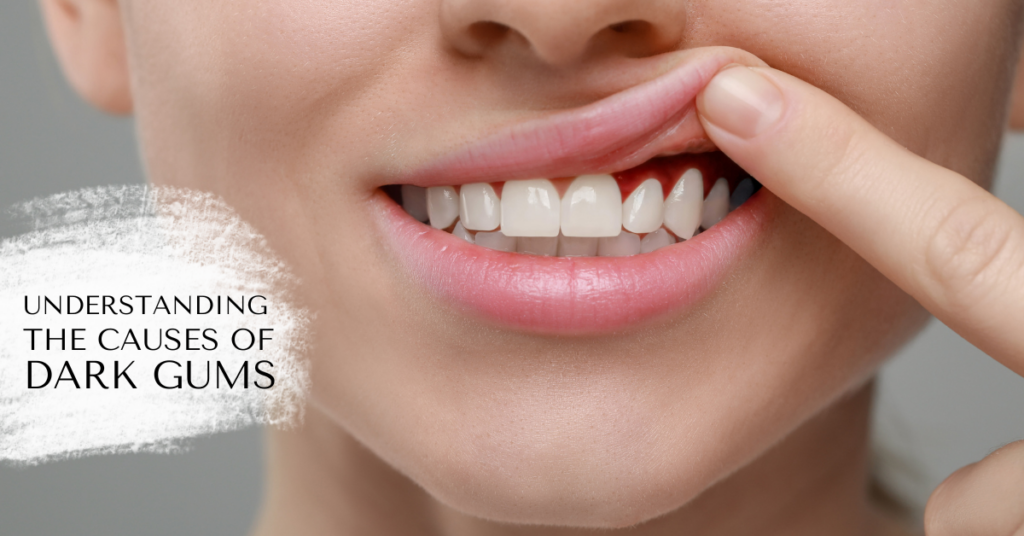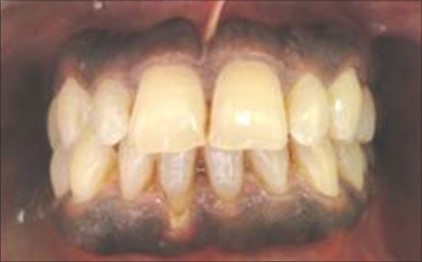Article reviewed by:
Dr Daylene Leong • Periodontist

Dark gums, also known as gum hyperpigmentation refers to the darkening or discolouration of the gum tissues. While this condition may cause worry, it is often a normal variation and not necessarily a sign of a health issue. Understanding the causes and available treatment options can help you make informed decisions about your oral health.
Table of Contents
What causes gums to become dark?

- Genetics
Dark gums can be a natural result of melanin production in the tissue, similar to how skin tone varies among individuals. People with darker skin tones are more likely to have naturally pigmented gums, due to an individual having more melanin in the body. - Smoking
Tobacco use can lead to ‘smoker’s melanosis’, where gum tissues darken due to increased melanin production as a response to chemical exposure from tobacco smoke. - Medications
Certain medications, such as minocycline, can cause pigmentation changes in certain individuals’ gums and other oral tissues. - Amalgam Tattoos
Tiny particles from dental amalgam fillings can embed in the gum tissue, causing dark spots known as amalgam tattoos. During amalgam filling removal, the dental handpiece might propel tiny amalgam particles that could get trapped in the soft tissues of your mouth. Amalgam tattoos are not harmful to your health.
Related:
Help for Gummy Smiles
Dark gums in children
Notice that your child has dark gums? It is usually just a variation in gum pigmentation, often tied to genetics — especially in children with darker skin tones. This happens because of melanin, the same pigment that gives skin and hair their color.
Sometimes, darker gums can be a sign of other issues such as poor oral hygiene, side effects from medication, or conditions like vitamin deficiencies or oral infections. While natural pigmentation isn’t anything to worry about, if you notice sudden changes or unusual discolouration, it’s a good idea to check in with a dental specialist or periodontist. Better safe than sorry when it comes to their smile!
What are the treatments for dark gums?
If gum discolouration is purely cosmetic, there are treatments available to lighten or remove the pigmentation:
- Gum depigmentation (Gingival depigmentation): this cosmetic procedure involves removing the outer layer of pigmented gum tissue to reveal the lighter tissue underneath. Techniques include laser therapy or chemical treatments.
- Cryosurgery: this technique uses extreme cold to destroy pigmented cells, promoting the growth of lighter gum tissue.
- Avoiding triggers: if smoking or medications are contributing factors, quit smoking or consult a healthcare professional about alternative medicines that may help prevent further discolouration.
While it is often harmless, you should consult a dentist or dental specialist if:
- the discolouration is sudden or spreading.
- it is accompanied by pain, swelling, or other symptoms.
- you are unsure about the cause or wish to explore cosmetic treatment options.
In conclusion, dark gums are typically normal and influenced by genetics, lifestyle, or external factors. If it affects your confidence or you suspect an underlying condition, speak to a dental specialist or periodontist for clarity and guidance toward the best course of action.
Need some dental assistance?
Drop us a text via the WhatsApp icon on the bottom right corner, enquire, or call us at (65) 6733 7883.







